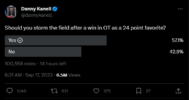I've been thinking about the decision to go on offense first in overtime and did some goggling. This is an article from a statistic journal in 2007, so the data is old. But a fascinating analysis and ultimate confirms that Prime is coaching on a whole other level. The key here is that despite the conventional belief, the team that scores as TD first wins 70% of the time. CSU had a chance to win if they went for 2, which I see as one of the many disadvantages of going first. But I think Prime would have considered that Norvell has no balls as a part of this decision. Anyway, I copied the more interesting parts below if you are a super nerd. Last paragraph is so cool though!
An Analysis of the Defense First Strategy in
College Football Overtime Games
∗
Peter A. Rosen and Rick L. Wilson
Abstract
Division 1-A college football adopted overtime rules in 1996. There have been 328 overtime
games since, and only four times have coaches opted to go on offense first upon winning the coin
toss. Thus, there is an accepted belief that starting on defense first is advantageous, as validated
by surveying college coaches. This study examines past game data to analyze whether there is
truly an advantage to being on defense first. Results show some support for this idea, but that there
may also be situations where not following the defense first strategy is worthwhile. Implications
to coaches are discussed.
5. DISCUSSION
The results of the analysis provide marginal support for the widely-held
conventional wisdom that starting on defense in overtime is advantageous.
However, in situations where pressure is seven points (the offense first team
scores a touchdown) and the defense first team is not a large favorite (13.5 points
or more) the offense first team holds a considerable advantage. In general, the
current strategy practiced by the coaches cannot be discounted as incorrect.
Because winning the coin toss provided only the slightest advantage, the
college football overtime process can likely be considered a fair process. The
concept of fairness is not easy to quantify, but the game data do not suggest that
losing the coin flip is an insurmountable disadvantage, as is the case in the NFL.
Some have criticized the college football overtime process for not including all
aspects of special teams and being too easy to score, but in terms of apparent
fairness to the teams, it does quite well.
Also, while favorites win more often than not, the expected number of
wins for favorites is lower that what one could expect by using Stern’s Law (as
discussed in the results section). Also, it was somewhat surprising that home field
advantage has little impact on game outcomes. Both of these phenomenon could
be due to the relative small number of possessions in overtime and the possibility
that a single, unusual play will decide the outcome.
It was shown that a team who starts on offense and scores a touchdown
wins over 70% of the time. The results also provided support that the team on
offense first should not settle for a field goal if at all possible. Because of this
evidence and the increased winning percentage by scoring a touchdown in the
first possession, coaches should consider being less conservative in their play
calling on the initial possession. This could include more risk-taking in specific
plays, or utilizing all four offensive downs to keep possessions alive. The micro-
strategy involved is worthy of future investigation.
If a team loses a coin flip, the study shows that it is still possible to use
this advantageously. There may be times when a coach who wins the coin toss
should consider eschewing conventional wisdom – for example, with a high-
powered offense or with a nothing-to-lose attitude, the psychological impact of
scoring first may outweigh the perfect information a team gets from playing
offense second.
Unfortunately, as few coaches have dared to be different, there is little
data on coin flip choice impact. Football coaches seem to be inherently risk-
averse, probably due to a lack of job security, and this risk of practicing
unconventional decision-making likely leaves little chance for someone to choose
an offense first strategy in the future.



